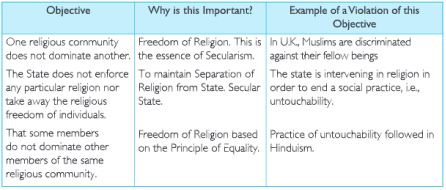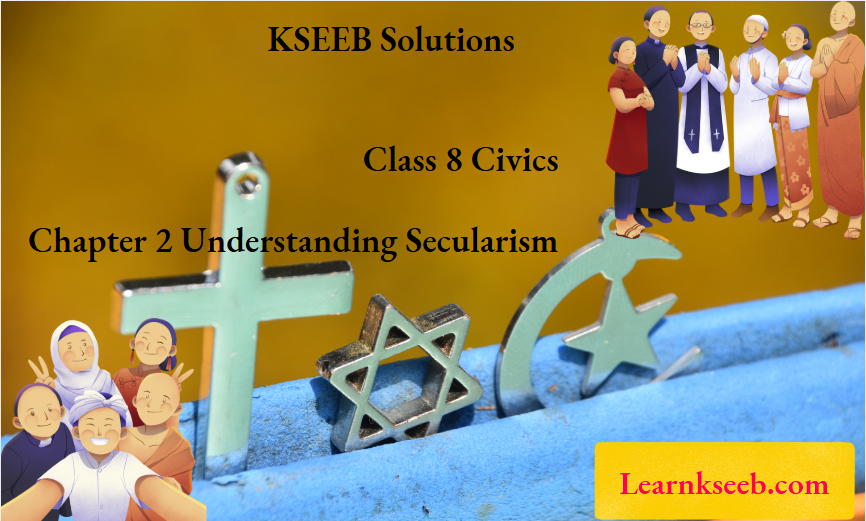KSEEB Solutions for Class 8 Civics Chapter 2 Understanding Secularism Textbook Questions
Question 1. Will the government intervene if some religious group says that their religion allows them to practice infanticide? Give reasons for your answer.
Answer
- In India, freedom of religion is given to all citizens. The Government of India as well as state governments do not interfere in the religious matter of any community.
- But the government has a right to intervene if some religious group says that their religion allows them to practice infanticide.
- No person or community ran given right to practice infanticide in the name of religion. In India.it is legally banned.
Question 2. Complete the following table

Kseeb Class 8 Civics Chapter 2 Understanding Secularism Solutions Pdf
Question 3 . Look up the annual calendar of holidays of your school. How many of them pertain to different religions? What does this indicate?
Answer
- In my school there are about 15 holidays. Main holidays of different religions are as follows:
- Hindu Religion: Deepawali, Dussehra, Maha Shivratri, Janmashtami, Holi, Makar Sakranti, Baisakhi. Raksha Bandhan. Islam Religion: Id, Bakra Eid, Muharram.
- Sikh Religion: Guru Nanak Devji, Guru Teg Bahadur, Guru Gobind Singh and all Guru’s Birthday. Christian: Christmas, Good Friday.
- Besides the above stated festivals, there are several other religious festivals celebrated in India, the school holidays of which may vary in different regions.
- Different religious holidays indicate that India is a Secular State and all religions are equally respected.

Sslc Class 8 Civics Understanding Secularism Question And Answers
Question 4. Find out some examples of different views within the same religion.
Answer
- India is a country of vast diversity. People of different religions live together in India. Indian Constitution gives freedom of religion of all persons residing in India.
- All persons are equally entitled to freedom to conscience and the right to profess, practice and propagate religion.
- Even within the same religion, people have a right to express their views. For example, in Hinduism some Hindus believe and practice idol worshiping, while there are many Hindus (Arya Samaj) who are against idol worship.
Class 8 Civics KSEEB Understanding Secularism Notes
Question 5. The Indian State both keeps away from religion as well as intervenes in religion. This idea can be quite confusing. Discuss this once again in class using examples from the chapter as well as those that you might have come up with.
Answer
- Indian Constitution has adopted secularism. In its Preamble, India have declared a Secular State. The Indian state both keeps away from religion as well as intervenes in religion. There is no official religion of the state.
- The state is separate from the religion. Right to freedom of religion has been guaranteed to all persons residing in India.
- But Article 25 permits the state to regulate economic, financial, political or other secular activities which may be associated with religious practice.
- The state may also provide for social welfare and reform as the throwing open of Hindu religious institutions of a public character to all classes and sections of Hindus. The Sikhs have been allowed to wear and carry Kirp.
- The Constitution has abolished untouchability and its practice in any form is forbidden. Moreover, religious freedom can be enjoyed subject to public order, morality and health.
Kseeb Class 8 Civics Understanding Secularism Textbook Solutions
Question 6. This poster alongside highlights the need for ‘Peace’. It says, “Peace is a never-ending process…. It cannot ignore our differences or overlook our common interests.” Write in your own words what you think the above sentences are trying to convey? How does it relate to the need for religious tolerance?
Answer
Peace is very essential for the progress of humanity. War means destruction. In fact, desire for peace is as old as humanity. That is why a peace is a continued process. Peace cannot ignore our differences or overlook our common interests. Religious tolerance is very essential for maintaining social harmony and peace.
Understanding Secularism Very Short Answer Type Questions
Question 1. Do you think that India is a Secular State? If yes, give two evidences which suggest that India is a Secular State.
Answer Yes, India is a Secular State. The term ‘Secular’ has been incorporated in the Preamble by the 42nd amendment of the Constitution. There is no state religion in India.
Question 2. What is the essence of secularism?
Answer The essence of secularism is that no one should be discriminated against on the grounds of their religious practices and beliefs. All forms of domination related to religion should end.
Question 3. Which religion is the official religion of India?
Answer India has no official religion.
Question 4. Write two sentences on why is it important that government schools do not promote any one religion?
Answer Government schools should not promote any one religion because students belong to different religions. If one religion is promoted then students of other religions will feel inferior.
Understanding Secularism Class 8 Civics Kseeb Important Questions
Understanding Secularism Short Answer Type Questions
Question 1. What is Secularism?
Answer
The dictionary meaning of Secularism is ‘Indifference of rejection or exclusion of religion and religious considerations.’ Secularism rejects religion completely. It rather supports anti-religious feelings. Secularism implies a way of life and conduct guided purely by materialistic considerations. It holds that materialism alone benefits mankind while religious feelings retard it But in its modem meaning. Secularism means freedom of religion and non-interference policy of State in religious activity.
Question 2. What is the meaning of the word Secular?
Answer
According to Oxford Advanced Learner’s dictionary, the meaning of the word Secular is ‘Worldly or material, not religious or spiritual.
Encyclopedia Britainnica says ‘Secular’ means “having no concern with religions or spiritual matters, anything which is distinct, opposed to or not connected with religion or ecclesiastical things, temporal as opposed to spiritual or ecclesiastical.”
Karnataka Sslc Class 8 Civics Chapter 2 Solutions In English
Question 3. Why it is important to separate the religion from the state in democratic societies?
Answer
- In order to protect the fundamental rights and to safeguard the minorities from the tyranny of majority, religion should be separated from the state.
- It is important to separate religion from the state, so that the freedom of the individuals can be protected. The people have the freedom to follow any religion.
- The separation between religion and state s important to prevent the domination of one religion over another. It is important to oppose the various types of domination that can happen within a religion.
Question 4. Mention two features of Indian Secular State.
Answer
- There is no State religion in India. No religion has been given special rights and no religion has been given any special help by the State.
- The Constitution grants religious freedom to all the people. Every individual can have faith in any religion.
Question 5. Write down the meaning of ‘Secular’ mentioned in the Preamble of Indian Constitution
Answer
- By inserting the word ‘Secular’ in the Preamble of the Constitution by 42nd amendment, India is declared a secular state.
- Such a system is adopted in the Constitution that India is made secular state without any doubt. Right to freedom of religion has been granted to all persons residing in India.
- All persons are equally entitled to freedom of conscience and the right to profess, practice and propagate religion. State has no religion of its own.
Question 6. Write two definitions of ‘Secular State’.
Answer
- According to Donald E. Smith, ‘The Secular State is a State that guarantees individual and corporate freedom of religion; deals with the individual as a citizen irrespective of his religion, nor does it seek either to promote or interfere with religion.”
- According to Venkataraman, ‘The State as such is neither religious, nor anti-religious but wholly detached from religious dogmas and activities and is thus neutral in religion.”
Class 8 Civics Understanding Secularism Notes Karnataka Board
Question 7. What is the meaning of Secularism in India?
Answer
- In India, Secularism does not mean the indifference of the State towards religion, rather it means giving respect to all religions by the State.
- Dr. B.R. Ambedkar said in the Constituent Assembly, “Secularism does not mean that we shall not take into consideration the religious sentiments of the people.
- All that what a Secular State means is that Parliament shall not be competent to impose any particular religion on the rest of the people.”
Understanding Secularism Long Answer Type Questions
Question 1. Mention the main characteristics of Secularism.
Answer The main features of Secularism are:
- No State Religion: In a Secular State, there is no State religion. In India, there is no religion of the State.
- Freedom of Religion: In a Secular State, there is freedom of religion. All citizens enjoy equal freedom of religion.
- Equal Respect for all Religions: In a Secular State, all religions are equally respected. All religions are treated alike.No Discrimination on the Basis of Religion: In a Secular State, no discrimination can be made on the basis of religion.
Question 2. “India is a Secular State.” Explain.
Answer
- India is a Secular State. By inserting the word ‘Secular’ in the Preamble of the Constitution by 42nd Amendment, India is declared a Secular State. Following are the features of India, as a Secular State:
- No State Religion: There is no State religion in India, that means that no religion has been attached importance by the State. No religion has been given special rights and no religion has been given any special help by the State.The State does not propagate any religion in any way. The state policy cannot be based on any religion.
- State Remains Aloof from Religion: The State has no religion of its own and it has kept itself aloof from all the religious activities. The State is neither religious, nor irrelgious and nor antireligious. It means that the State itself does riot take interest in any religion.
- All Religions are Equal: All religions are equal in the eyes of the State. No religion enjoys special rights. Nobody is discriminated or the basis of religion. The people of all the religions enjoy equal rights.
- Freedom of Religion: The Constitution grants religious freedom to all the people. Ever/ individual can keep faith any religion, he follows his religious customs, traditions and other principles. Each individual can very freely worship his religious gods. The government cannot in any way interfere in the religious affairs of the people.
- No Religious Education in Government Educational Institutions: Article 28 provides that no religious education shall be provided in any educational institution wholly or partly maintained by the state.
Understanding Secularism Class 8 Civics Summary And Explanation Kseeb
Question 3. Write down the criticism of Indian Secularism.
Answer. Indian Secularism has been criticised on the following grounds:
- Indian Secularism is Not Absolute: Under the Indian Constitution, Right to freedom of religion is given to every persor. But the Right to freedom of religion is not absolute. Article 25 permits the State to regulate economic, financial or other secular activities which may be associated with religious practice.
- Rights of Minorities: Under the Indian Constitution, minorities are given certain rights. In the name of minority rights. State can unjustly interfere in Hindu religious affairs.
- Meaning of Secularism not Clear: In India the real meaning of Secularism is not clear. People with different ideas try to colour the picture of Secularism in India. They try to impose their particular conceptions in regard to these matters with disastrous effects on young nationhood.
- Continuance of Religious Observances in Official Functions: Ministers usually take oath with some rituals of their religion. Inauguration of ships, institutions, etc. is done through Vedic hymns or mantras-Brahmins are called to perorm rituals. When President Dr. Rajendra Prasad, a devoted Hindu took part in so many religous functions, it was difficult for an average Muslim to believe that the Indian State was Secular.
- Differential Treatment with Religious Communities: The State in India, particularly the Government at State level is not very deep in its pursuit of secular ideals. This is seen in ‘reforming’ of Hindu Temples undertaken by some stite in India. But Muslim religious practice has not been touched by the Government
Understanding Secularism Hots Corner
Question 1 Is Secularism suitable for India? Explain.
Answer Secularism is most suitable for India due to the following reasons:
- Multi-Religious State: Secularism is most suitable for India because India is a multi-religious State. In a multi-religious State, it is not desirable to accept one single religion as the religion of the State.
- Karachi Session of the Congress: The Indian National Congress at its Karachi Session in 1931 had declared, “The State shall observe neutrality in regard to all religions.” All national leaders were in favour of Secularism.
- India is a Democratic State: The Indian polity is based on democratic principles and democracy and theocracy- are opposed to each other Freedom of religion and equality- of all religions is the basic characteristic of democracy.
- Partition of the Country: The division of the country, emphasised more than ever, the importance of Secularism. It is because large Muslim minority constituting a small part of the population continues to be the citizen of Independent India. Besides Muslims, there are other minorities.
Kseeb Class 8 Civics Understanding Secularism Mcqs With Answers
Understanding Secularism Miscellaneous Questions Multiple Choice Question
Question 1. Which article of the Indian Constitution abolishes untouchability?
(a) Article 17 (b) Article 15 (c) Article 18 (d) Article 16
Answer (a) Article 17
Question 2. Which amendment of the Constitution added the word ‘Secular’ in the Preamble?
(a)44th Amendment
(b)52nd Amendment
(c)42nd Amendment
(d)74th Amendment
Answer. (c) 42nd Amendment
Question 3. Which of the following rights aims at making India a Secular State?
(a) Right to Freedom of Religion
(b) Right to Equality
(c) Right to Education
(d) Right to Freedom
Answer. (a) Right to Freedom of Religion
Question 4. Which of the following is correct about secularism?
(1) Indifference or rejection or exclusion of religions and religious consideration
(2) Freedom of religion and non-interference policy of state in religious matters
(a) Only (1)
(b) Both (1) & (2)
(c) Only (ii)
Answer. (b) Both(1) & (2)
Question 5. When was the word ‘Secular’ added to the Preamble to the Indian Constitution?
(a) 1976
(b) 1968
(c) 1949
(d) 1986
Answer. (a) 1976
Question 6. Chapter IV of Article 51 of the Constitution includes
(a) Right to Freedom
(b) Right to Equality
(c) Right Against Exploitation
(d) Fundamental Duties
(d) None of these
Answer. (d) Fundamental Duties
Class 8 Civics Kseeb Understanding Secularism Short And Long Answer Questions
Understanding Secularism True or False
State whether the following statements are true or false:
(1) Secularism means equal respect for all the religions.
(2) The Constitution has abolished untouchability but it is still prevalent in some sections of Indian society.
(3) In Saudi Arabia, Non-Muslims are not allowed to build any temple, church, etc.
(4) In Secularism there is no separation of religion from the state.
(5) Islam is the official religion of Pakistan.
(6) Right to vote is a Constitutional Right.
(7) To defend the country is our Fundamental Duty.
Answer. (1) True (2) True (3) True (4) False (5) True (6) True (7) True
Simplified Notes For KSEEB Class 8 Civics Understanding Secularism
Understanding Secularism Match the following

Understanding Secularism Picture Interpretation
- Look at the image alongside and state what you understand from it.
 Answer The image depicts students taking the ‘Pledge of Allegiance’ in an American school.
Answer The image depicts students taking the ‘Pledge of Allegiance’ in an American school. - Does this occur in every school of USA?Answer No. The ’Pledge of Allegiance’ is recited by most of the children of government schools at the beginning of the day.
- What are the challenges that it faced?Answer. The challenges that this pledge faced was that the phrase ’Under God’ is used. It was agreed upon 60 years ago that if it goes against their religious believes, students of government schools are not required to recite it It was argued that the phrase ‘Under God’ separates the Church and the State, which the First Amendment of USA guarantees.
Part A – Our PASTS – III (History)
- Chapter 1 How, When and Where
- Chapter 2 From Trade to Territory The Company Establishes Power
- Chapter 3 Ruling the Countryside
- Chapter 4 Tribals Dikus and the Vision of a Golden Age
- chapter 5 When People Rebel 1857 And After
- Chapter 6 Colonialism and the City: The Story of an Imperial Capital
- Chapter 7 Weavers, Iron Smelters and Factory Owners
- Chapter 8 Civilising the “Native” Educating the Nation
- Chapter 9 Women, Caste and Reform
- Chapter 10 The Changing World of Visual Arts
- Chapter 11 The Making of the National Movement 1870s -1947
- Chapter 12 India After Independence
Part B – Resources and Development (Geography)
- Chapter 1 Resources
- Chapter 2 Land,Soil, Water, Natural Vegetation and A wildlife Resources
- Chapter 3 Mineral and Power Resources
- Chapter 4 Agriculture
- Chapter 5 Industries
- Chapter 6 Human Resources
Part C: Social and Political Life -III (Civics)
- Chapter 1 The Indian Constitution
- Chapter 2 Understanding Secularism
- Chapter 3 Why Do We Need a Parliament ?
- Chapter 4 Understanding Laws
- Chapter 5 Judiciary
- Chapter 6 Understanding Our Criminal Justice System
- Chapter 7 Understanding Marignalisation
- Chapter 8 Confronting Marginalisation
- Chapter 9 Public Facilities
- Chapter 10 Law and Social Justice
